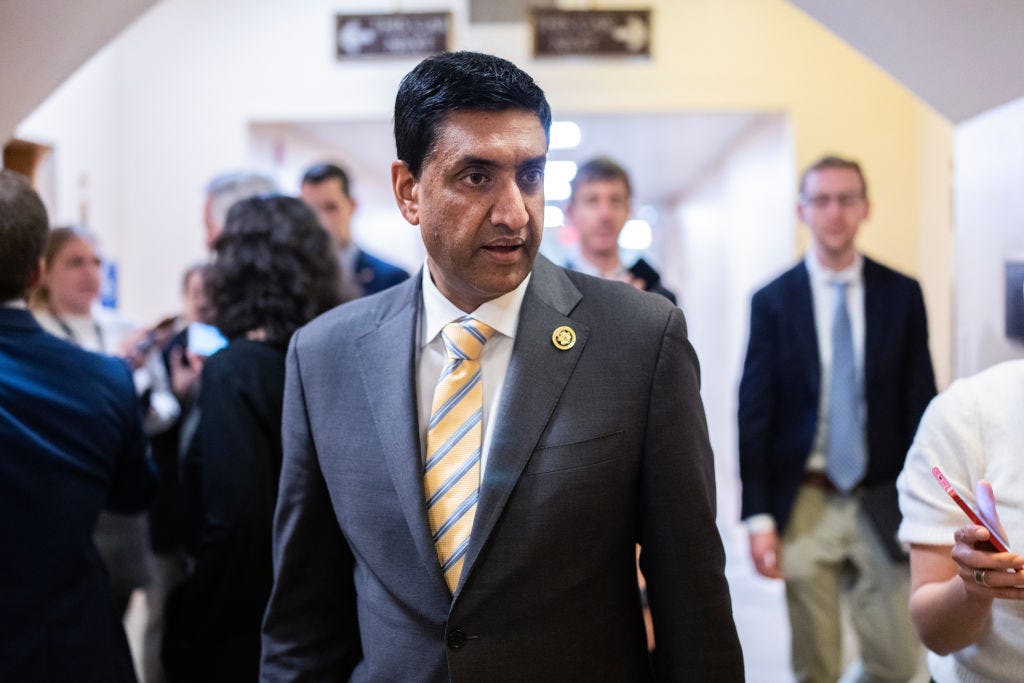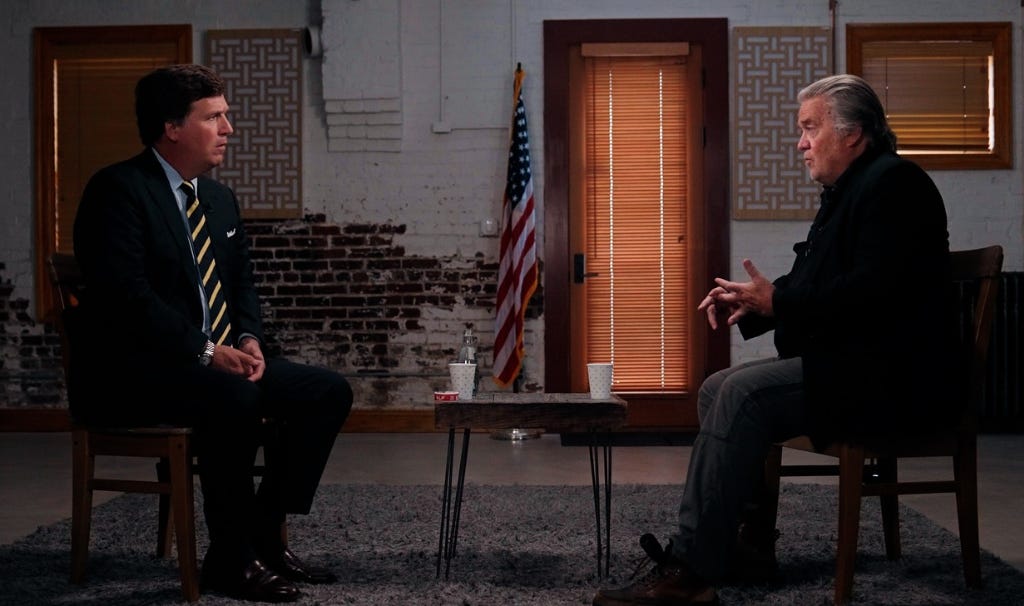
The Free Press

A bipartisan anti-war coalition—including progressive anti-Zionists, a coterie of MAGA Republicans, libertarians, and angry young lawmakers and influencers from across the political spectrum—is emerging in response to Israel’s attack on Iran and fears that America is about to be dragged into yet another “forever war” in the Middle East.
On Tuesday—a day after President Donald Trump returned early from the G7 summit in the Canadian Rockies, promising “a real end” to Iran’s nuclear program—Republican Rep. Thomas Massie of Kentucky and Democratic Rep. Ro Khanna of California introduced a bill that would stop Trump from going to war with Iran without congressional approval.
Members of the hyper-progressive Squad, including Rep. Alexandria Ocasio-Cortez, immediately signed on. Republican Rep. Marjorie Taylor Greene, reflecting the partisan tensions many Trump loyalists are presumably feeling, said there is no need for a bill for now—but held out the possibility she might sign on later.
Citing the War Powers Resolution of 1973, the measure bars the United States from engaging in “unauthorized hostilities” in Iran. “This is not our war,” Massie posted on X.
“The American people aren’t falling for it again,” Democratic Rep. Rashida Tlaib posted on X. “We were lied to about ‘weapons of mass destruction’ in Iraq that killed millions + forever changed lives.”
The Massie–Khanna bill comes one day after Democratic Senator Tim Kaine of Virginia introduced parallel legislation in the Senate. The Senate bill would likely enjoy the support of many, if not most, of the 26 Republicans who opposed last year’s Ukrainian military aid bill—if the commander in chief were still a Democrat.
The House bill follows 25-year-old former Democratic National Committee official David Hogg’s declaration of war, as it were, on Democrats who support Israel’s war.
“Any Democrat who supports the war with Iran needs to be primaried,” Hogg said Monday. “Our generation grew up going through two multitrillion dollar wars we should have never been involved in. We are not fucking going back to that.”
The ongoing debate about whether the United States should wade into Israel’s war against Iran comes at the same time that American politics are in the midst of a “great scramble” following years of overseas wars in the Middle East, housing and financial crises, political polarization, racial discord, and economic stratification. The old labels and compartments have been mostly sapped of their meanings; both parties find themselves enmeshed in protracted identity crises. And Israel’s multipronged war—against Iran’s proxies in Gaza, Lebanon, and Yemen, and now against Iran itself—has brought that scramble into sharp relief.

Khanna, in a series of text messages to The Free Press, explained that, after more than two decades of “very powerful D.C. Beltway figures and neocons pushing for regime change wars,” a robust, “grassroots movement” that is “outside the party establishment” was finally asserting itself.
One bellwether: J.D. Vance.
Vance has repeatedly lashed out at American interventionists but now finds himself straddling the fine line separating his ideological and partisan commitments.
In a long message posted to X, he backed up Trump: “I believe the president has earned some trust on this issue,” the vice president said. “And having seen this up close and personal, I can assure you that he is only interested in using the American military to accomplish the American people’s goals.”
In other words: The guy who won the White House in no small part by railing against U.S. presidents for waging wars in faraway countries was saying, by way of his vice president, that he could be trusted to wage war in a faraway country.
That prompted Khanna to quote-tweet Vance’s tweet, saying: “With respect, that is a lot of words with no position. Will you stand with @RepThomasMassie and me and oppose U.S. strikes in Iran without Congressional authorization?”
Vance has not replied to Khanna.
“This is a defining moment for him,” Khanna told me. “Will he stand with the MAGA base and Bannon, Greene, Carlson”—referring to Republican Rep. Marjorie Taylor Greene of Georgia and right-wing media personalities Tucker Carlson and Steve Bannon—“or will he be representing the Beltway neocons?”
When I asked Khanna whether he’s now closer, ideologically, to America First godfather Steve Bannon than Vice President J.D. Vance is—at least when it comes to America wading into foreign wars—he demurred. “You’d need to ask Bannon,” Khanna said. “He’ll tell you.” (Bannon did not return multiple phone calls.)
Republicans, as The Free Press’s Eli Lake recently noted, have split into two camps: the hawks versus the restrainers. Those camps are openly warring—and using their television shows and podcasts to lobby the president.

Less noticed has been the splintering among Democrats.
Democrats Senator John Fetterman and Rep. Ritchie Torres of New York are among the Jewish state’s most unwavering supporters—not just in their party but in Washington. They want Trump to help Israel eliminate Iran’s nuclear facilities and even topple the mullahs.
“This is a remarkable development,” Fetterman told me, speaking of Israel’s success in eliminating much of the Iranian military high command within days. “How crazy would it be for us not to finish off their nuclear capacity at this point? We absolutely must do that—give Israel the 30,000-pound bombs or the B-2s or whatever.”
Torres lamented the waning support for Israel on the left and right. “Historically, support for Israel has been bipartisan,” he told me. “Increasingly, opposition to Israel is becoming bipartisan. The far left and far right are converging.”
This convergence was neatly reflected in the flurry of statements members of both parties posted after Israel’s initial attack—many of which relied on the same tired language: the calls for “peace” and “de-escalation,” the insistence that Israel not “drag” the United States into war.
Early Friday, Greene posted to X: “I’m praying for peace. Peace. That’s my official position.”
One could easily imagine Jack Reed, the senior Democrat on the Senate Armed Services Committee, saying the same thing.
A plurality, or even a majority, of Democratic lawmakers feel compelled not to be too vocal about their support of Israel’s war, or not to be seen as going too far lest they appear Islamophobic or racist or pro-Trump.
“Israel’s alarming decision to launch air strikes on Iran is a reckless escalation that risks igniting regional violence,” Reed said in a statement Friday. “These strikes threaten not only the lives of innocent civilians but the stability of the entire Middle East and the safety of American citizens and forces.”
Or Rashida Tlaib.
On Thursday evening, as Israel’s attack was starting to unfold, Tlaib posted: “The Israeli government bombing Iran is a dangerous escalation that could lead to regional war. War Criminal Netanyahu will do anything to maintain his grip on power. We cannot let him drag our country into a war with Iran.”
It’s not that there aren’t plenty of Democrats who quietly, tacitly support Israel’s war on Iran, Democrats told me. It’s that a plurality, or even a majority, of Democratic lawmakers feel compelled not to be too vocal about their support, or not to be seen as going too far lest they appear Islamophobic or racist or pro-Trump. These Democrats, including many party leaders, are quick to defend Israel’s “right to self-defense,” but they mostly limit themselves to abstractions. They are loath to come out for or against any particular decision or operation.
Case in point: House Minority Leader Hakeem Jeffries, who said Friday, “Israel is an ally and has a right to exist as a Jewish and [d]emocratic state. Our commitment to Israel’s security is ironclad. Iran is the largest state sponsor of terror in the world and a sworn enemy of the United States and Israel.”
As one Democratic strategist told me, referring to Democrats like Jeffries and his counterpart in the Senate, Minority Leader Chuck Schumer: “They just have no courage at all. They are afraid of their staff, because their staff most likely are people who are younger and educated at elite places and are living in sort of the left-wing, massively online world, and they’re telling them, ‘You can’t say this, everyone I know hates Israel.’ ” This trend jibes with a broader anti-Zionism, which many Jews regard as a thinly veiled antisemitism, that has gripped many young Americans—on the left and right.
Torres found this mystifying. “Peace in the Middle East has no greater friend than Israel, and it has no greater enemy than the Islamic Republic of Iran, which has been the most destabilizing force in the region,” he said. He was deeply troubled by the “false narrative” that Israel is the aggressor. Israel, he said, “is simply defending itself against an existential threat.”
He was also confused by the Massie–Khanna bill. “What does it mean to intervene?” Torres texted me. “Do the sponsors of the bill think the U.S. should do nothing to intercept missiles aimed at murdering hundreds of thousands of Americans in Israel?” (Mike Huckabee, the U.S. ambassador to Israel, recently noted on Honestly that 700,000 Americans live in Israel.)
Given Republicans’ reluctance to challenge the president, it’s unlikely that either the House or Senate will pass legislation he opposes. But if the U.S. does enter the war and Americans die, their constituents will likely urge them to sign on.
“I appreciate where it comes from, this idea [that] the U.S. can’t be involved at all, because if we get involved at all the next step is an Iraq War, a quagmire, and I appreciate the hangover that people have from a very bloody war,” Kenneth Baer, who worked as a speechwriter for Al Gore and in the Obama White House, told me. “But it seems to me like lunacy to think that those are your only two choices”—boots on the ground or isolationism. “That’s such a leap. That’s apparently where Tim Kaine is, and it’s where Tucker Carlson is.”
Baer added: “It just feels like the analytical brain has been so warped.”




